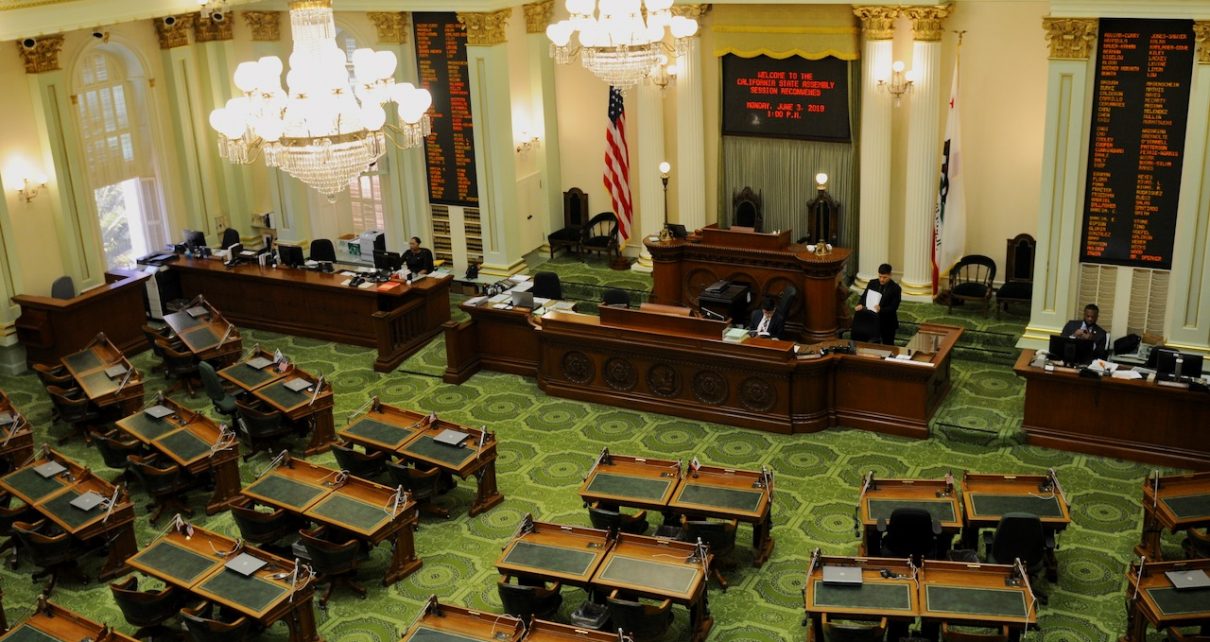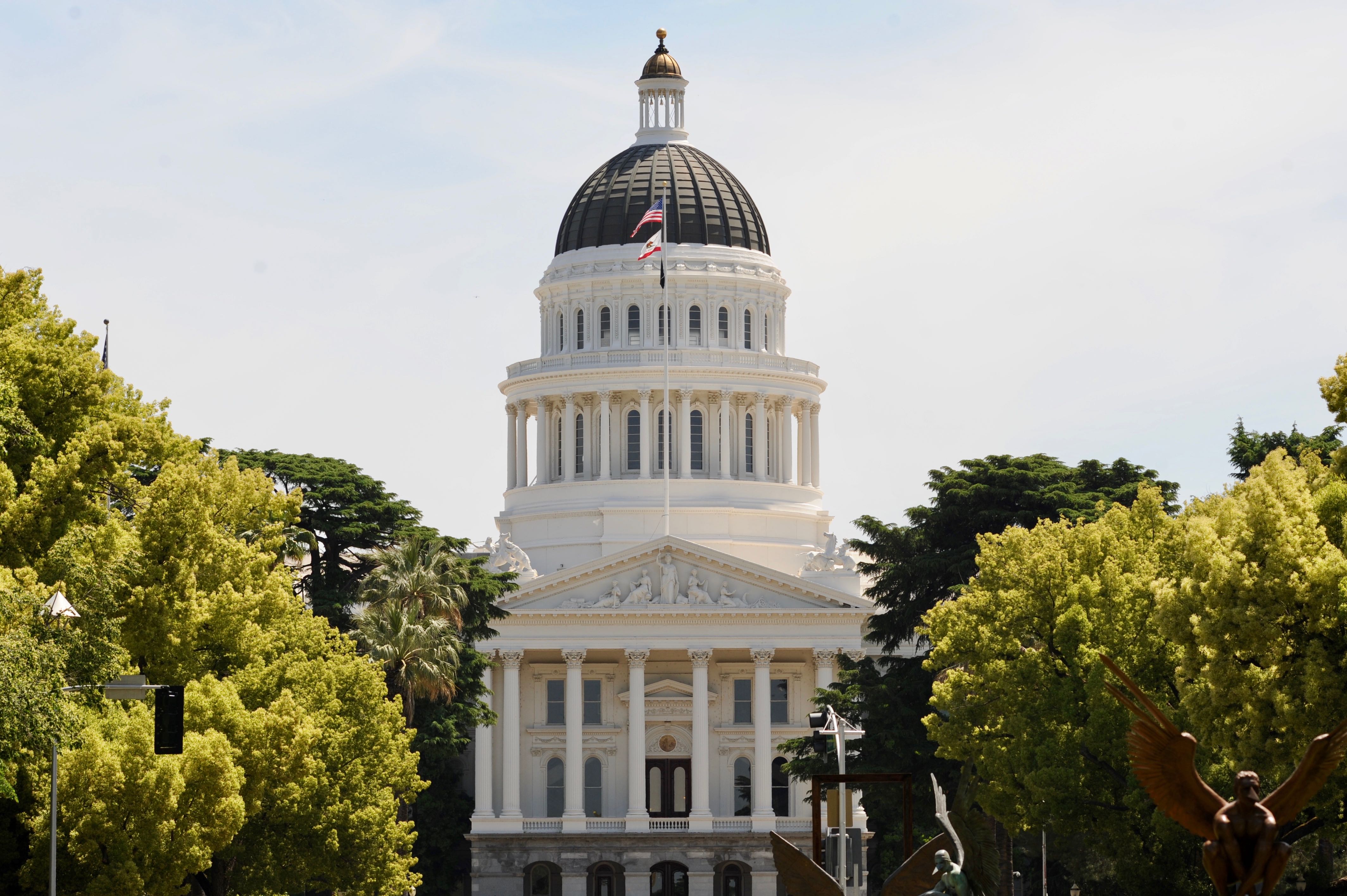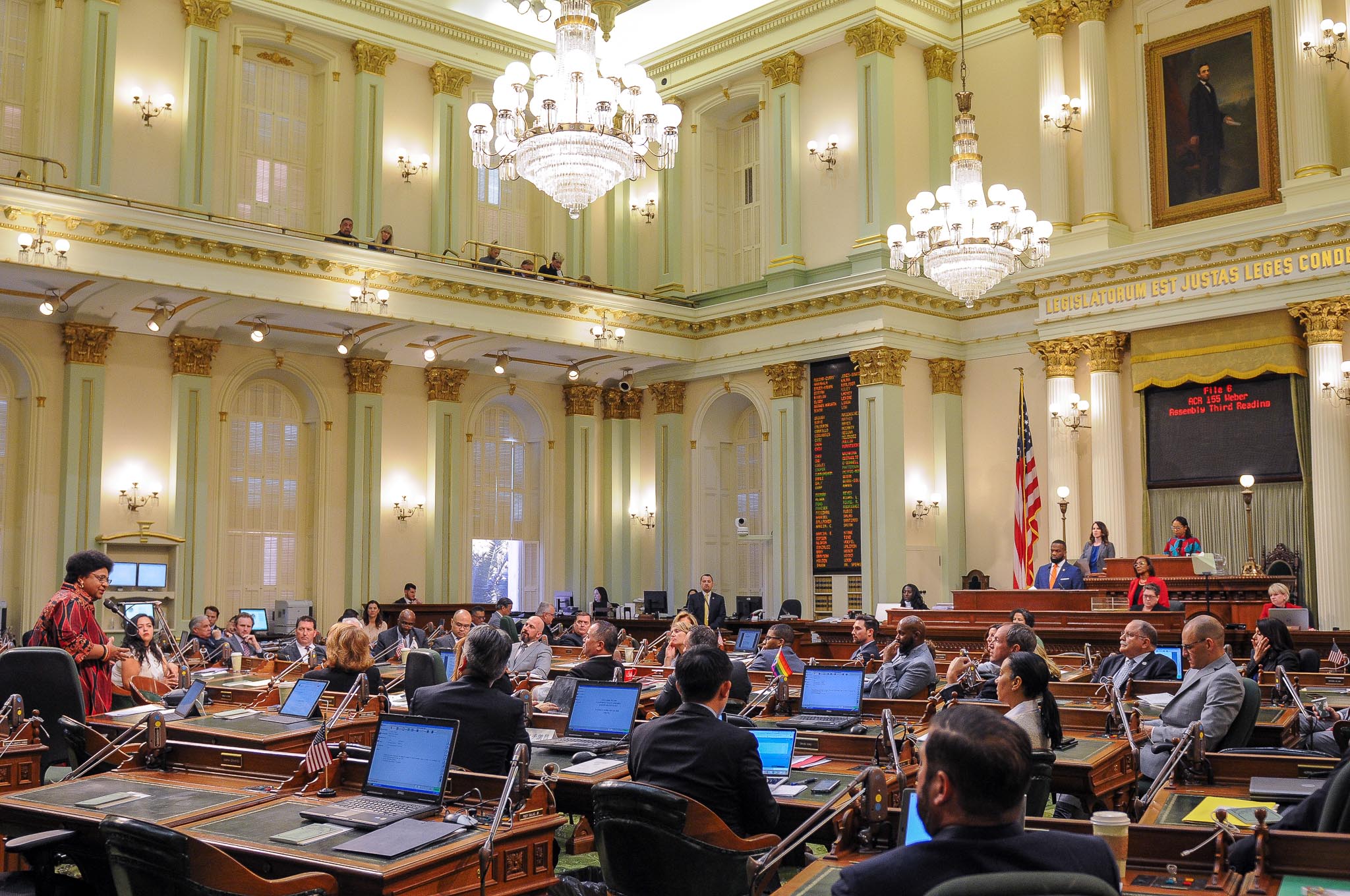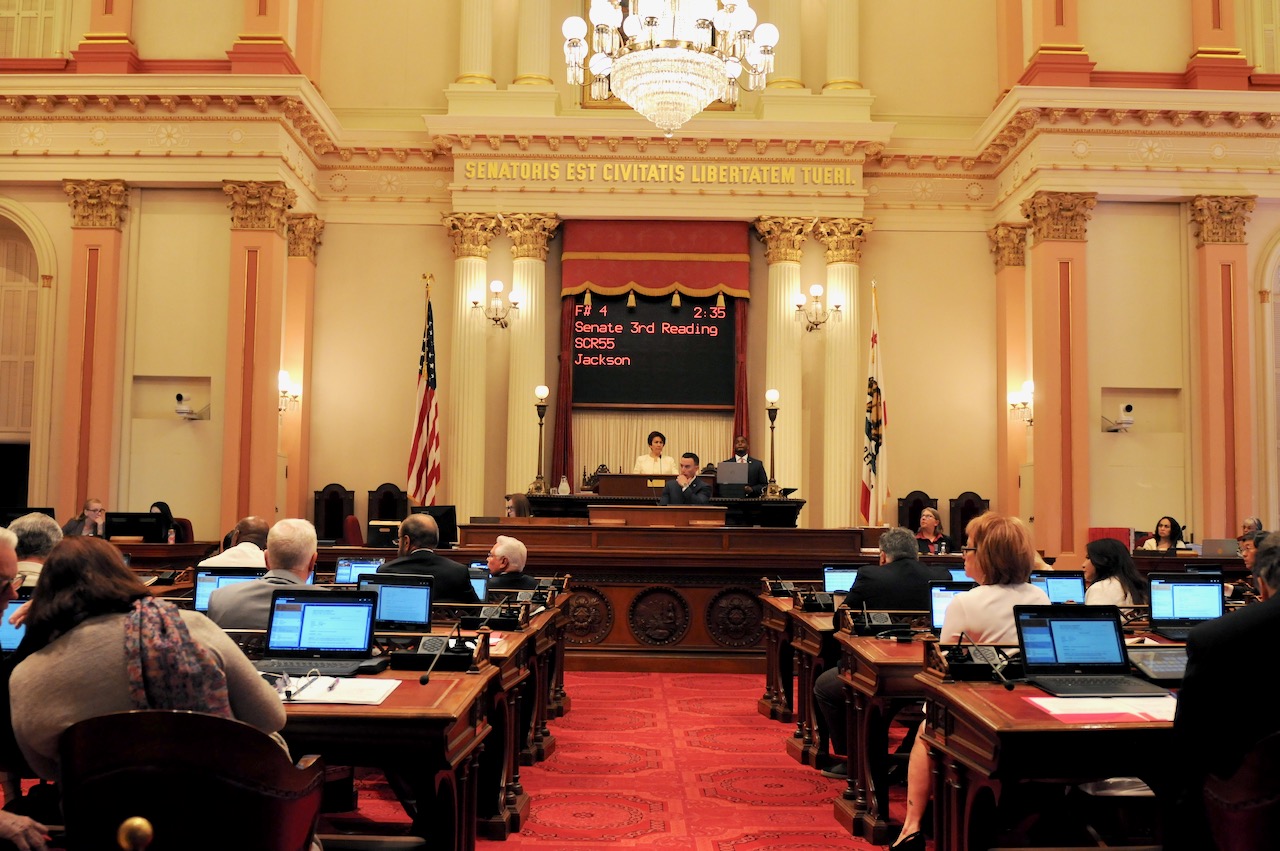
California State Assembly. (Photo: Kevin Sanders for California Globe)
Frequently Asked Questions about California’s Political Laws
Are there prohibited activities of state agency public officials?
By Chris Micheli, November 3, 2023 2:45 am
For those not familiar, I put together the following questions and answers for those queries that are most often posed regarding California’s political laws.
What created the Political Reform Act (PRA)? The PRA was adopted by the voters on June 4, 1974 by Proposition 9.
Are all PRA filings open to the public? Yes, every report and statement filed is a public record open for public inspection and reproduction during regular business hours. Copying charges do apply.
What is a “behested payment”? It means a payment that is made at the behest of a committee, an elected officer, a member of the Public Utilities Commission, or an agent for them.
Who is a “public official”? It means every member, officer, employee, or consultant of a state or local government agency.
Who is not a “public official”? The definition excludes a judge or court commissioner in the judicial branch of government; a member of the Board of Governors and designated employees of the State Bar of California; a member of the Judicial Council; a member of the Commission on Judicial Performance; and, a federal officer or employee serving in an official federal capacity on a state or local government agency.
What is a “state agency”? It means every state office, department, division, bureau, board and commission, and the Legislature.
What is the role of the Fair Political Practices Commission (FPPC)? The FPPC has primary responsibility for the impartial, effective administration and implementation of the PRA.
Does the FPPC issue advisory opinions? Yes, any person may request the FPPC to issue an opinion with respect to that person’s duties under the PRA. Also, any person who acts in good faith on an opinion issued to that person by the FPPC is not subject to criminal or civil penalties for so acting, provided that the material facts are as stated in the opinion request.
How does the FPPC initiate an investigation? Upon the sworn complaint of any person or on its own initiative, the FPPC must investigate possible violations of the PRA relating to any agency, official, election, lobbyist or legislative or administrative action.
Does the FPPC have to notify a person about its investigation? The FPPC cannot make a finding of probably cause regarding an alleged violation of the PRA unless, at least 21 days prior to the FPPC’s consideration of the alleged violation, the person alleged to have violated the PRA is notified of the violation by service of process or registered mail, provided with a summary of the evidence, and informed of that person’s right to be present in person and represented by counsel at any proceeding.
Does the FPPC have to hold a hearing about an alleged violation? The FPPC may hold a hearing to determine if a violation has occurred.
Does the FPPC have to accept an ALJ’s decision? No, but whenever the FPPC rejects the decision of an administrative law judge, then the FPPC must state the reasons in writing for rejecting the decision.
What are the potential bases of liability for a violation of the PRA? (1) Violating any provision of the PRA; (2) Purposely or negligently causing any other person to violate any provision of the PRA; or, (3) Aiding or abetting any other person in the violation of any provision of the PRA.
Is there any alternative to an administrative proceeding under the PRA? The FPPC may establish and administer a political reform education program for persons who violate the PRA, subject to specified limitations.
What powers does the FPPC have in conducting its investigations? The FPPC may subpoena witnesses, compel their attendance and testimony, administer oaths and affirmations, take evidence and require by subpoena the production of any books, papers, records or other items material to the performance of the FPPC’s duties or exercise of its powers.
Is the FPPC’s decision subject to legal challenge? Yes, an interested person may seek judicial review of any action of the FPPC.
Are there limitations on agency officers being involved in license, permit, or entitlement proceedings? Yes, while a proceeding involving a license, permit, or other entitlement for use is pending, and for 12 months following the date a final decision is rendered in the proceeding, an officer of an agency cannot accept, solicit, or direct a contribution of more than $250 from any party or a party’s agent, or from any participant or a participant’s agent if the officer knows or has reason to know that the participant has a financial interest.
Are there any exceptions when a public official has to recuse themselves due to a contribution in excess of $250 in a proceeding? Yes, a public official is not prevented from making or participating in the making of a governmental decision to the extent the official’s participation is legally required for the action or decision to be made. However, the fact that an official’s vote is needed to break a tie does not make the official’s participation legally required.
Can a legislator be involved in any legislation or actions that would personally benefit the legislator financially? Any Member of the Legislature cannot make, participate in making, or in any way attempt to use the Member’s official position to influence specified governmental decisions in which the Member knows or has reason to know that the Member has a financial interest.
What are examples of prohibited governmental decisions for legislators who have a financial interest in the decision’s outcome? Approval, modification, or cancellation of any contract to which either house or a committee of the Legislature is a party; introduction as a lead author of any legislation that the Member knows or has reason to know is nongeneral legislation; any committee or floor vote on what the Member knows or has reason to know is nongeneral legislation; and, any action or decision when the Member received compensation from a lobbyist employer who would benefit from the action or decision.
What are prohibitions involving elected state officers? They are prohibited from making or participating in the making of, or using the officer’s official position to influence, any governmental decision before the agency in which the elected state officer serves, where the officer knows or has reason to know that the officer has a financial interest.
When does an elected state officer know or have reason to know about a financial interest in an action or decision? Either when the action or decision will have a direct and significant financial impact on a lobbyist employer from which the officer has received any income within the preceding 12 months and the action or decision will not have an impact on the public generally or a significant segment of the public in a similar manner, or when the action or decision will have a direct and significant financial impact on any person, distinguishable from its impact on the public generally or a significant segment of the public, from whom the officer has received any compensation within the preceding 12 months for the purpose of appearing, agreeing to appear, or taking any other action on behalf of that person, before any local board or agency.
When does a public official have a financial interest in a decision? A public official has a financial interest in a decision if it is reasonably foreseeable that the decision will have a material financial effect, distinguishable from its effect on the public generally, on the official, a member of the official’s immediate family, or on any business entity, real property, or source of income where the public official has a direct or indirect interest.
Are there prohibited activities of state agency public officials? Yes, a public official of a state agency is prohibited from being paid to act as an agent or attorney for, or otherwise represent, any other person by making any formal or informal appearance before, or any oral or written communication to, the official’s state agency or any officer or employee thereof, if the appearance or communication is for the purpose of influencing a decision on a contract, grant, loan, license, permit, or other entitlement for use.
Do elected officials have to file Statements of Economic Interest? Yes, every person who is elected to a specified office is required, within 30 days after assuming the office, file a statement disclosing the person’s investments and the person’s interests in real property held on the date of assuming office, and income received during the 12 months before assuming office.
Do appointed officials have to file Statements of Economic Interest? Yes, every person who is appointed or nominated for a specified office is required, within 30 days after assuming the office, file a statement disclosing the person’s investments and the person’s interests in real property held on the date of assuming office, and income received during the 12 months before assuming office.
Does the Statement of Economic Interest have to disclose any business positions held? Yes, which means any business entity in which the filer is a director, officer, partner, trustee, employee, or holds any position of management.
What happens if a person makes a gift totaling $50 or more in a calendar year? That person must disclose to the recipient of the gift both the intermediary or agent’s own full name, street address, and business activity, as well as the full name, street address, and business activity, if any, of the actual donor.
What is the definition of an “honorarium”? It generally means any payment made in consideration for any speech given, article published, or attendance at any public or private conference, convention, meeting, social event, meal, or like gathering.
Who is prohibited from accepting an honorarium? An elected state officer, elected officer of a local government agency, candidate for office, or other specified individuals cannot accept any honorarium.
Is there a gift limitation on an elected state officer, elected officer of a local government agency, or other specified individuals? Yes, they are limited to $590 from any single source in any calendar year.
What are the rules concerning travel expenses? There are detailed rules regarding travel, including actual transportation and related lodging and subsistence that is reasonably related to a legislative or governmental purpose, or to an issue of state, national, or international public policy. These expenses are generally not prohibited or limited in specified circumstances.
Can campaign funds be used for charitable functions? Campaign funds may be used to make donations or loans to bona fide charitable, educational, civic, religious, or similar tax-exempt, nonprofit organizations, where no substantial part of the proceeds will have a material financial effect on the candidate, elected officer, campaign treasurer, or any individual or individuals with authority to approve the expenditure of campaign funds held by a committee, or an immediate family member of one of those individuals, and where the donation or loan bears a reasonable relation to a political, legislative, or governmental purpose.
Can campaign funds be used to pay for vehicle expenses? There are detailed rules that apply to the purchase of a vehicle under specified condition, leasing a vehicle, and operating costs of a vehicle.
Can campaign funds be used for leasing real property? No, these funds cannot be used for payment or reimbursement for the lease of real property or for the purchase, lease, or refurbishment of any appliance or equipment.
Can campaign funds be used for home security systems? Yes, campaign funds may be used to pay, or reimburse the state, for the costs of installing and monitoring an electronic security system in the home or office, or both, of a candidate or elected officer who has received threats to the candidate’s or elected officer’s physical safety, provided that the threats arise from the candidate’s or elected officer’s activities, duties, or status as a candidate or elected officer and that the threats have been reported to and verified by an appropriate law enforcement agency.
Can campaign funds be used to pay for cybersecurity devices? Yes, campaign funds may be used to pay for, or reimburse the state for, the costs of installing and monitoring hardware, software, or services related to the cybersecurity of electronic devices of a candidate, elected officer, or campaign worker.
Can campaign funds be used to compensate an elected official? No, they cannot be used to compensate a candidate or elected officer for the performance of political, legislative, or governmental activities, except for reimbursement of out-of-pocket expenses incurred for political, legislative, or governmental purposes.
What is the liability for a person who violates the honorarium or gift laws? Any person who makes or receives an honorarium, gift, or expenditure in violation of the PRA is liable in a civil action brought by the FPPC for an amount of up to three times the amount of the unlawful honorarium, gift, or expenditure.
What does the PRA require the FPPC to do? The PRA requires the FPPC to regulate campaign finance laws, conflicts of interest for local and state public officials, lobbyist registration and reporting, political mass mailings, and gift laws.
Who makes appointments of the five FPPC commissioners? The Governor has 2 appointees, and the Attorney General, the Secretary of State, and the Controller each appoint one member of the FPPC.
Can FPPC commissioners be removed? The members of the FPPC may be removed by the Governor, with concurrence of the Senate, for substantial neglect of duty, gross misconduct in office, inability to discharge the powers and duties of office, or violation of specified sections of law.
- Legislative Intent Does Not Equate to a Mandate - April 27, 2024
- Frequently Asked Questions about State Agency Ethics Training - April 26, 2024
- Frequently Asked Questions about When Elected Officials Take Office - April 25, 2024





Thank you, this is a great resource! The FPPC’s website is also worth a visit. There you can find all the commission’s investigations and resolutions. They have a nice search engine that lets you search for actions by name or date. Great way to find out who’s been caught being naughty.
https://www.fppc.ca.gov/